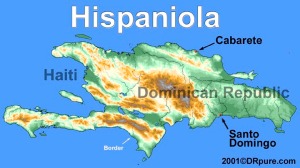First, let me thank everyone who has commented on my recent posts. I’m extending a big shout out to Pipil, Jeremy, Emma, AnaRC, Bugys, Jose, and Macon D. Keep those cards and letters coming!
Second, at the risk of trying your patience, I have one more thought about my recent move to Los Angeles. As I wrote, the movers who took our stuff to California were Latino. I wrote about how they arrived late at every stage of the process, but I didn’t say why.
Well, the reason is simple: They were on Hispanic time. As such, they were incapable of being punctual.
It is a cultural trademark of Latinos that we run late, or flake on deadlines, or just wander in at some point during the party. I’ve heard many reasons for this. Perhaps it is the laidback culture of the siesta that carried over to America. Maybe we don’t sweat the small stuff, and therefore refuse to obsess about what the clock says. Or perhaps we’re prone to some kind of time-space dyslexia that causes us to proclaim, “It’s only two minutes away” when the destination is in another city.
All I know is that every clock in my mother’s house is set fast. I am not exaggerating. My mom claims that this forces her to pick up the pace, because it tricks into thinking that she’s even later than she actually is. It works to some degree, because she tends to run less behind schedule than she did in the past.
For example, when I was in high school (and before I got my drivers license), I racked up myriad detentions because I had to rely on my mom to get me there. Every morning we rushed out the door as if the starting time for school had been cruelly moved up without notice. I protested to my teachers that arriving late was out of my control, but they insisted that I was consistently tardy because of adolescent belligerence rather than cultural norm. Then I got slapped with another detention.
In my family, I developed a reputation for being the only one who is ever on time. Perhaps it’s because I’m half-white. More likely, I just got frustrated at everyone always being late and tried to make up for it singlehandedly. My efforts have served only to increase my blood pressure.
Look no further than the Christmas Eve celebrations at my mom’s house, which start promptly at 4:00… or 5:00… or 6:00… or whenever everyone shows up. But my family always arrives, and we have a great time. Being late is difficult when nobody has bothered to set a time to meet in the first place, but we manage it.
I know other cultures claim that they have this affliction. I’ve heard of Arab time and Greek time. I’m sure they’re telling the truth. But honestly, I doubt they’re much competition when it comes to the utter lack of temporal awareness. Hispanic time is another animal altogether.
Still, if we must have some cultural issue with punctuality, we should try to make it more interesting. If we were exactly forty-three minutes and nineteen seconds late for everything, then we’d have something quirky. Instead, we’re just the tardy ones.
But again, why are we so perpetually behind schedule? What possible reason can there be for the fact that we Latinos take time so frivolously?
Well, I have the answer, and I plan to go ahead and tell you. But I’m running a little late right now. So just give me a minute or two… five tops.
Don’t worry, I’ll catch up to you.














